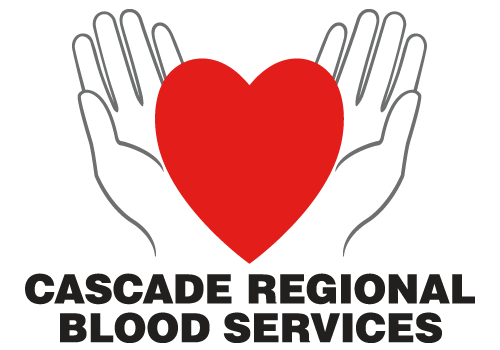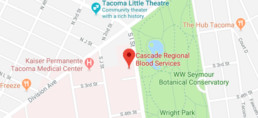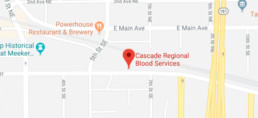Donating Whole Blood
Donating whole blood is quick and easy. It typically takes less than an hour from registration to chocolate milk and snacks. After collection, whole blood is processed into 3 components for use by patients. Red cells carry oxygen to organs and tissue. Platelets promote blood clotting. And plasma is the fluid that carries blood cells throughout the body, and also contains proteins that help clotting.
Where Can I Donate?
You can donate whole blood at one of our three centers located in Tacoma, Puyallup, and Federal Way. We also conduct blood drives throughout South King and Pierce Counties.
What Can I Expect When Donating?
Whether you donate at a mobile drive or at a center, your experience will involve the same steps.
The process is an ‘essential service’ and very easy and safe. Bring photo id with you. You will be registered, and fill out a questionnaire to confirm that you are eligible to donate that day. In a private Health History Rooms, one of our friendly phlebotomist will ask you a ‘mini’ physical, checking your blood pressure, temperature, pulse, and iron level. You will be led to the donor floor and relax on a comfy bed for your donation. We collect about one pint of blood in a sterile bag. Afterwards, you’ll enjoy refreshments and then be on your way.
Doctor Prescribed Therapeutic Treatments
All Therapeutic treatments MUST call 1-877-24-BLOOD to speak with a receptionist for appointment availability. Please do not attempt to make an appointment online. Thank you.
We frequently receive questions about eligibility to donate blood. We have compiled answers to some of the most common questions. If you need more information or would like to discuss eligibility further, please don’t hesitate to contact a donor specialist at 1-877-24-BLOOD.
AGE
If you are 16 or 17 years of age, you will need a signed parental permission to donate form.
WEIGHT
You must weigh at least 110 pounds to donate blood.
BLOOD PRESSURE
Your blood pressure must be between 180/100 and 90/50. Most high blood pressure medications are acceptable.
FREQUENCY OF DONATION
Whole blood can be donated every 56 days. Platelets can be donated every seven days, up to 24 times a year. Plasma can be donated every 28 days.
DONATION PREPARATION
It is important to eat a substantial meal and drink plenty of water or juice before donating. Avoid beverages with caffeine or alcohol before donating. It is also important to be well rested.
TRAVEL
Travel to tourist areas in most parts of the world is acceptable. You may be deferred for three months if you have traveled to a malarial risk area. Ask a donor specialist for the most recent information.
DENTAL WORK
You must wait 72 hours after a root canal, tooth extractions or periodontal procedure. There is no waiting period for cleanings or fillings.
IMMUNIZATIONS
There is no deferral period after a flu shot if you are symptom-free. However, other immunizations may have a two to four week deferral period.
PREGNANCY
You may donate six weeks after the end of your pregnancy, but not during.
DIABETES
If you have diabetes, and your condition is controlled by diet, oral medication or insulin, you may donate. For specific questions, please contact a donor specialist.
HEART DISEASE AND CARDIOVASCULAR ACCIDENTS
If symptom-free for at least six months, some donors with heart disease, recent heart surgery, heart attacks or CVAs are eligible to donate. This is evaluated on a case-by-case basis.
CANCER
People who have been successfully treated for some types of cancer are eligible to donate.
TATTOOS AND BODY PIERCING
You are eligible to donate after receiving a tattoo if the tattoo was performed in a licensed commercial establishment in Washington state. If you do not meet those criteria, you must wait three months to donate after getting a tattoo. Professional body and ear piercings are also acceptable when performed at a licensed commercial establishment. Otherwise, these are a three month deferral.
ANTIBIOTICS
You must be off antibiotics for 48 hours and symptom free before donating blood. Antibiotics taken in low doses for preventative treatment or acne may be okay.
OTHER MEDICATIONS
Hormones, antidepressants, cholesterol, most blood pressure medications and other prescription medications are acceptable, as long as you are feeling well.
Cascade Regional Blood Services is your community blood center.
We have proudly supplied blood products to MultiCare Health System hospitals and health centers in Pierce and South King Counties since 1946. Volunteer donors supply 100 percent of the blood used at our community hospitals.



